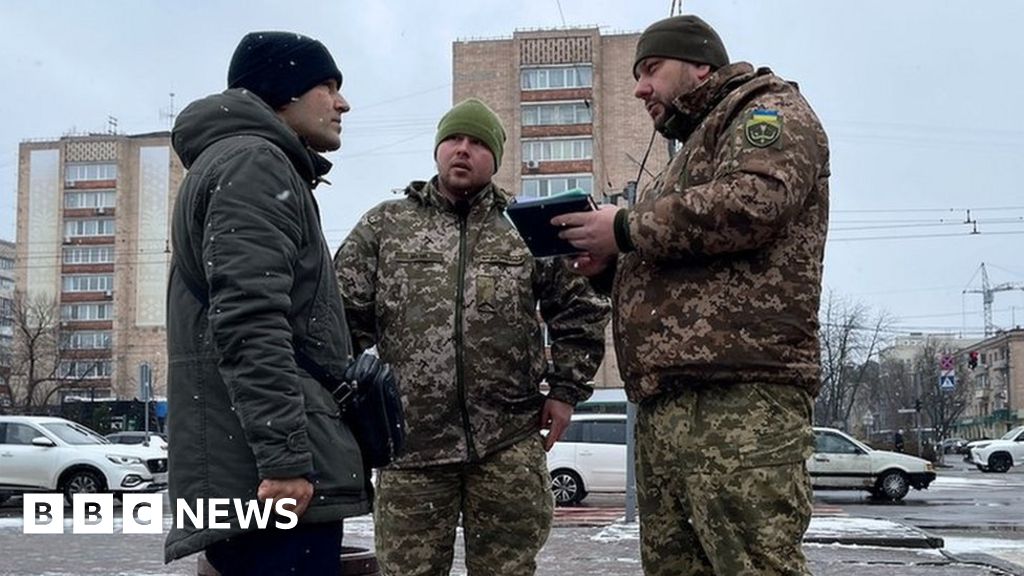When Pavlo Zhilin and his patrol hit the streets of Cherkasy, men often swerve to avoid them.
Pavlo is a conscription officer looking for soldiers for Ukraine's army.
But almost two years into Russia's full-scale invasion, there's no flood of volunteers to the front line anymore.
Most of those who wanted to fight are either dead, injured or still stuck at the front waiting to be relieved by new recruits.
In the central town of Cherkasy, like elsewhere, finding them isn't easy now that the first burst of enthusiasm and energy has faded.
Ukraine is exhausted. Pavlo's story
"I don't get it. People are out and about, like the war is somewhere far away. But this is a full-scale invasion, and it's like people still don't care," Pavlo says.
He is frustrated by what he sees as indifference.
"We need everyone to come together like they did on the first day. Everyone was united then, like brothers."
Instead, the security service in Cherkasy is constantly shutting down local social media channels that warn people when the conscription teams are in town and alert them to areas to avoid.
At 24, Pavlo has sacrificed a lot for his country.
He grew up dreaming of being a soldier - his eyes light up when he remembers that - and he was serving in the army in February 2022 when Russian troops rolled across the border.
He fought near Kyiv, then Soledar in the eastern Donbas, where the battle was brutal. That first summer, he was moved to Bakhmut.
"We came under heavy fire. A shell landed next to me. I lost my whole elbow. There was nothing left," he says, describing an attack in which he was badly injured.
He managed to crawl beneath a bush and he began to pray.
The soldier admits that getting to hospital was a huge relief: not just because he'd survived, but because he was finally off the front line. "It was hard there. I can't even put it into words."
He looks down and falls quiet.
Pavlo's injuries were severe. His right arm was amputated below the shoulder, he still feels pain where his limb is missing, and he has shrapnel in his leg. His basic prosthetic gives him limited movement.
But he wanted to go on serving, so he became a conscription officer.
After all he's been through, I wonder whether he understands why other men evade the draft.
"One day, their children will ask what they did during the war, when the men were fighting. When they reply, 'I was hiding,' then they'll plummet in the children's eyes," Pavlo says firmly.
And yet the price Ukraine is paying to defend itself is already immense.
When I ask Pavlo whether he's lost friends in the fighting, he admits that there's "almost no one left" from his entire company.
"The only ones left are [injured] like me. The others are dead." Serhiy's story
Away from the eastern front line, there are signs of recovery among the ruins.
Irpin, near Kyiv, was occupied by Russian forces at the very start of the war. There are shell-shattered buildings all around, but also the sound of building work.
For those who lost everything, there are now small "towns" of pre-fabricated cabins, each with two rooms and a shower room. About half of the residents are from Irpin itself. Others have been displaced from closer to the front.
Lilia Saviuk and her husband have just moved in from Kakhovka in the east, still occupied by Russian forces.
At the start of the war, their son Serhiy was captured there and held in a basement. Lilia says he was tortured for shouting pro-Ukrainian slogans.
When Serhiy got out, he left the region and immediately signed up to fight for Ukraine.
When Lilia flicks through her phone for pictures to show me, it throws up images of terrible injuries.
Most of the flesh on one of her son's legs was blown off and his foot was in tatters.
Serhiy was injured last autumn in Avdiivka, where the fighting has been fierce and even Ukrainian officials admit their army is outgunned and outmanned.
One source put the difference at 8-1, in Russia's favour.
Lilia and her husband couldn't leave Kakhovka with Serhiy, because their elderly parents refused to go. So they stayed, under occupation, terrified the Russians might discover that their son was a soldier.
They finally left when Serhiy was injured, to be with him in hospital, but Lilia cries with the shame she feels at leaving relatives behind.
"We call and ask them, 'Is it quiet?'" she says, meaning is there shelling. "Everyone there is waiting for liberation. For it to be loud. But there is only quiet.
"People have been crying for so many months and nothing is getting any better."
But there is another fear driving Lilia's tears.
She shows me videos of her pushing her son around in a wheelchair. The two are laughing, covered in snow. Then there are pictures of the skin grafts he's had, where Lilia says the doctors have "performed a miracle".
But as soon as Serhiy is fully fit, he's told his mother he'll go back to the front. He says there are not enough soldiers there. His friends need him.
So Lilia is praying for the war to end first.
"I think he has already done his duty," she says, eyes full of tears. "As a mother, it is a sin to say this, but while he is in hospital, I can sleep calmly. I can't sleep when he is on the front line.
"So I am glad my son is in hospital now, although I really shouldn't say this. I'm glad he's not at the front." Vladislav's story
On the edge of Cherkasy, there is a cemetery with a long line of recent graves. They're for the men of all ages from the town who've died fighting since Russian President Vladimir Putin gave the order to invade.
Ukraine honours the dead as heroes, but it's left to their families to grieve.
Each grave is decorated with national flags and heaped with wreaths and flowers. There are images, fixed to crosses or etched into marble headstones, of the soldiers in military uniform.
Inna can't bear to put her son's photo on his grave yet. The image that she used for his funeral is still at home. She's not ready to let go.
Vladislav Bykanov was killed last June by a mine explosion near Bakhmut. He was about to turn 23 and already a deputy commander.
"I believe my son died doing the right thing," Inna says firmly, as her daughter cries quietly beside her.
"I'm a teacher and I always tell the children this: we are right, we are defending our country and our children. My son was defending us. He believed in this cause. And I believe," Inna says before pausing to take in the flags and faces all around.
She hasn't visited the cemetery for a little while and the row of soldiers' graves has grown.
"Do you think my son wasn't afraid? I was afraid too, when he went. Everyone's afraid of dying," she answers, when I wonder what she thinks of those who avoid signing up to fight.
"But maybe being enslaved by Russia is more frightening? Now we see death. It's very difficult. Very difficult. But there is no way back. We can't give up."



https://www.youtube.com/watch?v=UpX-vtW2f54
edit: Oh wow, it's even the same arm.
Exactly what came to mind when I was reading the article. Reality is beyond satire. You have a guy who's arm got blown off and who is fully admiting everyone in his unit is either dead or wounded like him, and he's wondering "Why does no one want to fight anymore?"
grumble grumble "Why won't people make WH40k a reality" grumble grumble
That reminds me of just how utopian and idealist Heinlein's thinking was writing the Starship Troopers novel, like the insane fascist society he described which locked personhood behind military service actively tried to dissuade people from joining the military, hence things like the recruitment officer being a triple amputee who plays up his injuries while working before then, in a subsequent scene, equipping advanced bionics and living a normal life. Along with things like the military allowing anyone to quit at any time for any reason, except in wartime. Like it's just so brainwormed and contradictory, that a system that demands violent subservience and participation in it would also try to disincentivize that. Why demand a military class if you also don't want participation in it? It's just this fucking 20th century democratic fascism idealism shit where "only real men" knowingly take up a "horrible burden" to enforce the state's hegemony, but no one has to because that would violate the NAP lmao.
I thought they could even quit during war time (because its always war time), just not in the middle of a battle?
Also, I remember that there weren't a whole lot of "citizens" in that book. There were lots of unenfranchised and there were those actively in the military, but there weren't all that many fully enfranchised citizens.
I could have sworn it was "while at war" because I thought they were actually at peace before they started the multi-front war with the bugs and the other more humanized aliens who switch sides after being terror bombed with things like "a timed bomb that loudly counts down over thirty seconds, to let civilians run away so it's just scaring them instead of killing them" which is a whole other can of brainworms to unpack.
Wait, was this portrayed as a humanitarian thing, or was it called out for being terrorism?
Heinlein seemed to think it was a clever, cool idea to maximize the impact of terror bombings. IIRC he spent like a paragraph talking about how smart it was.
Heinlein may be a mixed bag overall in some senses and I can't deny that he wrote some extremely relatable egg shit, but his politics and ideas were pretty uniformly awful.
It is funny that the military is just an elaborate scheme to get rid of lobbyists
I found a YouTube link in your comment. Here are links to the same video on alternative frontends that protect your privacy: